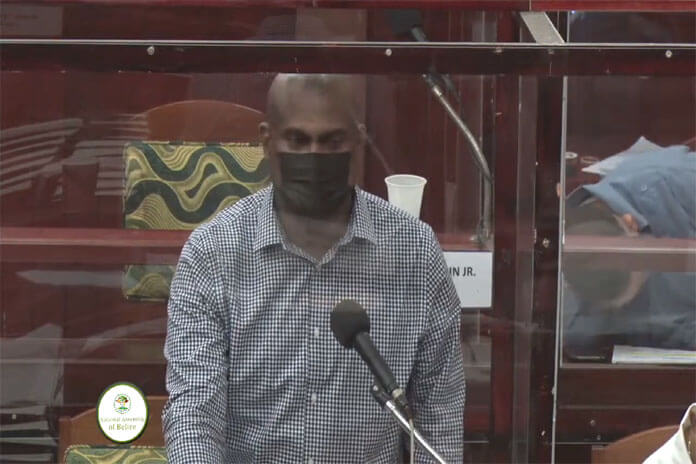BELIZE CITY, Wed. Oct. 27, 2021 — Amidst the heated debates and jam-packed agenda during Tuesday’s special sitting of the House of Representatives, a historic motion to address the question of reparations in Belize was introduced by Deputy Prime Minister, Hon. Cordel Hyde.
“Now, therefore, be it resolved that this honorable House debate the issue and take the unanimous decision that, one: the Government of Belize is morally, legally and ethically obliged on behalf of the former slaves and the descendants of Belize, then the British settlement in the Bay of Honduras, to present the appropriate case in the United Kingdom to determine whether as a matter of law, the United Kingdom is liable for the unlawful seizure, transportation and subsequent enslavement of African people in Belize under British colonial rule up until 1833 and to receive the appropriate reparations from Britain,” stated Hon. Hyde after foregoing the recitals that would typically precede the lengthy motion.
In 2013, following the 34th Regular Meeting of the Conference of Heads of Government of the Caribbean Community, the CARICOM Reparation Commission was established to pursue reparatory justice for the Trans-Atlantic Slave Trade and Slavery and Native Genocide. At the time, it was advised that national reparation committees be created, but those never came into existence.
In February of this year, during the Thirty-Second Intersessional Meeting, CARICOM Heads of Governments recommitted themselves to addressing the issue of reparation. It was against this backdrop that this historic motion, which for the first time in Belize seeks to evaluate the horrifying cost of slavery in Belize and the long-term effects on the descendants of the enslaved, was tabled in the House.
Hon. Hyde went on to state during his introduction of the bill, “The Government of Belize, in presenting this case to the appropriate body, shall seek to valuate not only the economic cost of slavery in Belize but also, based on expert evidence, seek reparation for the former slaves and their descendants for the denial of their culture and history, human rights abuses, including but not limited to murder, rape, flogging, branding, denial of freedom of movement, freedom to worship, freedom to own land and the right to education; and for the severe generational mental and psychological damage to slaves and their descendants, long after 1838, caused by their degraded status as slaves and perpetuated by associated systemic racism and racial discrimination.” “
In Jamaica, the Government is preparing to present a petition to the Queen on the question of reparations for referral to the Judicial Committee of the Privy Council in England. Belize is expected to take similar steps in its call for reparations for African descendants.
The ten-point reparation action plan outlines the need for: 1. Full Formal Apology, 2. Repatriation, 3. Indigenous People Development Program, 4. Cultural Institutions, 5. (Measures to Address) the Public Health Crisis, 6. Illiteracy Eradication, 7. African Knowledge Program, 8. Psychological Rehabilitation, 9. Technology Transfer, 10. Debt Cancellation.
Historical records pinpoint 1640-1807 as the period during which the British involvement in the Trans-Atlantic Slave trade was at a peak. During this time, over 3 million people of African origin were inhumanely packed in ships and sailed away from their homes, to work in the British colonies in the Caribbean. While other European powers such as Portugal, Spain, and France were also involved in the Trans-Atlantic Slave Trade, the atrocities perpetrated by the British are relevant to our reality as former colonial subjects and the descendants of once enslaved Africans.
In 2018, Her Majesty’s Treasury was the subject of public vilification after a slip-up which led to a revelation in a Twitter post that the British paid almost $300 billion dollars in today’s currency to finance a slave compensation package required by the 1833 Act. This compensation, instead of being disbursed to those who had been enslaved, was paid to the former slave owners and their descendants and was just cleared from British public debt in 2015.
The Twitter post from the HM Treasury published on Friday, February 9, 2018 states, “Here’s today’s surprising #FridayFact. Millions of you have helped end the slave trade through your taxes. Did you know? In 1833, Britain used £20 million, 40% of its national budget, to buy freedom for all slaves in the Empire. The amount of money borrowed for the Slavery Abolition Act was so large that it wasn’t paid off until 2015. Which means that living British citizens helped pay to end the slave trade.”
This means British tax-paying descendants of slaves and even subjects in colonial holdings whose ancestors were enslaved were made to pay for this great wrong by the British government largely without their knowledge.
It must be noted that while the Abolition Act was passed in 1807, Emancipation took place years later in 1834, and the following four years, until 1838, was the brutal apprenticeship period. The effects of slavery still reverberate to this day across the Caribbean, and the move to set the record straight is a first step in righting historic wrongs carried out against people of African descent.
Also, it is worth noting that the proceeds from the sweat, blood, and tears of enslaved persons in the British Caribbean colonies fueled the Industrial Revolution of England which propelled them to becoming an economic power on the world stage. Over 150 years later, research shows that carbon emissions released since the start of that period has been the driving force for the greenhouse effect and global warming. CARICOM nations, including former colonies held by the British, stand to be the first to feel the full brunt of Climate Change, researchers say.
Deputy PM Hyde called on all CARICOM nations to follow suit and take similar steps to rekindle the reparation conversation in their jurisdictions.

